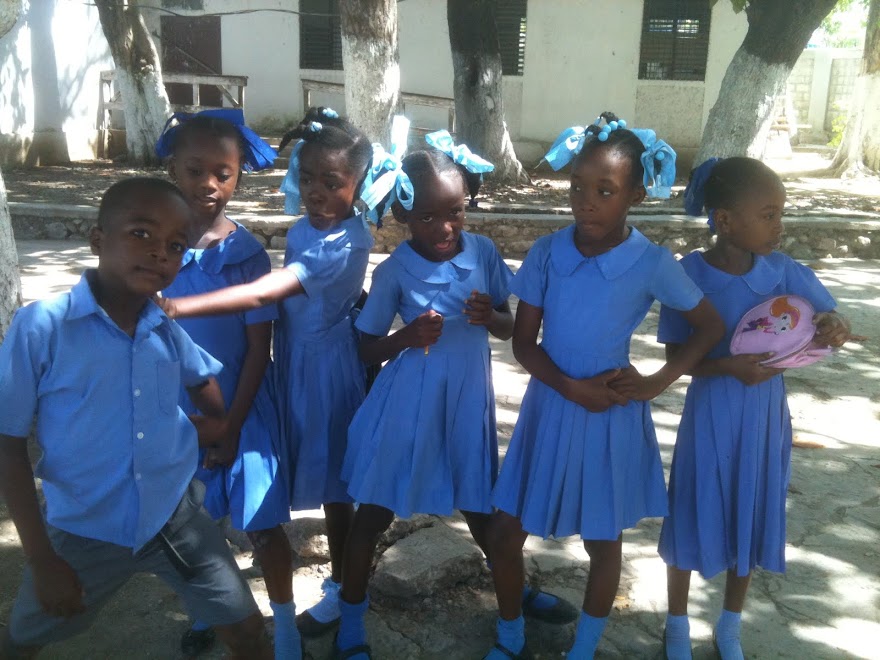by Nick Candee
Mesi anpil / Thanks so much to all our friends and family that accompanied us on this educational and medical mission! From the hand-crafted cloth bags, through donations for our ton ofmedicaments, dental supplies, the sorted and scrubbed pill bottles, and more. Thanks too to Zoll Medical for donation of an AED / Automatic External Defibrillator for Hopital St Croix.
Our team of 22 volunteers adapted to the challenges of operating in Haiti, as we worked in three zones:
v Mobile medical clinics via Hopital St. Croix and the agentes sante / health agents: we saw about 1,185 patients (vs our record 1,030 patients last year). This is a very conservative estimate. Most of our team worked in the mobile clinics.
v Developing a relationship with FSIL, the nursing school of the Episcopal University of Haiti; six team mates stayed at FSIL’s gleaming new guest house, and five were guest lecturers with the school:; Michelle Gillig RN on ER nursing; Gloria Korta MD on OB/GYN Caroline Larson OT on occupational therapy Marissa Seligman on pharmacology Dan Seligman DPM on podiatry.
v Developing a relationship with Ecole St Croix, with the head of school Mr. Emmanuel, and head of lower school, Mr. Manuel; Carol Hokana, Barbara Foot, Elizabeth Foot, and Tom Mitchell were guest teachers in the English classes. Nick and team met with Mr. Emmanuel to endeavor to determine how to mobilize volunteers in the future for specific projects.
Villages and Number of Patients we treated that day (note family members are sometimes added after intake, so numbers are approximate, and conservative).
v St Mathieu, 175 patients – Monday
v Sarbousse, 260 patients – Tuesday
v Fayette, 235 patients – Wednesday
v Trouin, 240 patients – Thursday
v K-Moncil, 275 patients – Friday
Total for the week: 1,185 patients treated – with some softness around those numbers.
A few patient cases:
Sad news: 18 month old Rose Nerlie, whom we met one year ago with an eye tumor, a retinoblastoma, died earlier this winter. A year ago we did get her and her mom to the best pediatrics hospital in Port au Prince; a spinal tap determined that the cancer was metastatic … so she received chemotherapy and de-bulking surgery to improve the quality of her life in the days left to her.
Glad news! Nancye Mims found the boy Alexandre with strabismus (crossed-eyes) in Trouin. Via eye specialist surgeons and the local priest, a team is working on surgery for this youngster so he can enter school. Kindly see Carol Hokana’s earlier report.
In Trouin Dr. Alex saw a 9 month old girl suffering from severe malnutrition and mild dehydration; the mother and child were referred to CNP / Children’s’ Nutrition Program.
On our last day in K-Moncil, two patients were so acutely ill that our team organized transportation to Hospital Ste Croix (there is presently no EMS in the region, nor a fire department).
Our last day in K-Moncil was surprisingly our busiest – in contrast to this village last year, where the clinic ended by 2 PM.
We then returned to Hopital St Croix, and bid farewell to our Haitian colleagues: the medical / dental team of Dr Alex Le Brun, Dr Emmanuel Bastien and his wife as dental assistant, and Kathiana and Kesnelda, our two nursing students from FSIL nursing school. We were delighted to see our nurse colleague from prior years, Rosaline Telfort now working in HSC Outpatient Dept., but keen to rejoin us next year (thanks Virginia Harrington). And we bid farewell to our 14 translators, many veterans of clinics past with us, our three reliable drivers, our team of 5 cooks, and the housekeeping team headed by the ever- positive Mme. Bellevue. And of course our beloved volunteer guest house managers, Dr Bob and Robin Sloane of Fort Worth, TX.
SUMMARY:
We are thankful for all the love that came with us on this trip, and thankful for the kind cooperation of our Haitian team as well as the patience of our Haitian patients. We are thankful for the many skills our 22 teammates provided, from providers such as Dokte Reid Boswell MD who addressed issues in tropical medicine, to Henry Marks who pitched in on the eye clinic, to Jason Kinchen who joined us in the role of our spiritual advisor and chaplain – both for the team and for our patients; a prayer with our Haitian brothers and sisters is intangible but integrated our efforts in physical healing.
On Saturday 14 March 16 of our team returned home. Six of us (Linda Brown, Nick Candee, Mary Candee, Nancye Mims, Carol Hollingshead and Bill Saunders) remained to tour Haiti for a week, to discover a country outside the mobile medical clinics. Let us know if you’d like to hear the stories about what we found!
We continue to support our medical and school partners here throughout the year – and your financial and prayer support is treasured as we look forward to our sixth year of partnership here.
Kindly note we anticipate additional reflections from some of our 22 volunteers
Kindly note we anticipate additional reflections from some of our 22 volunteers
